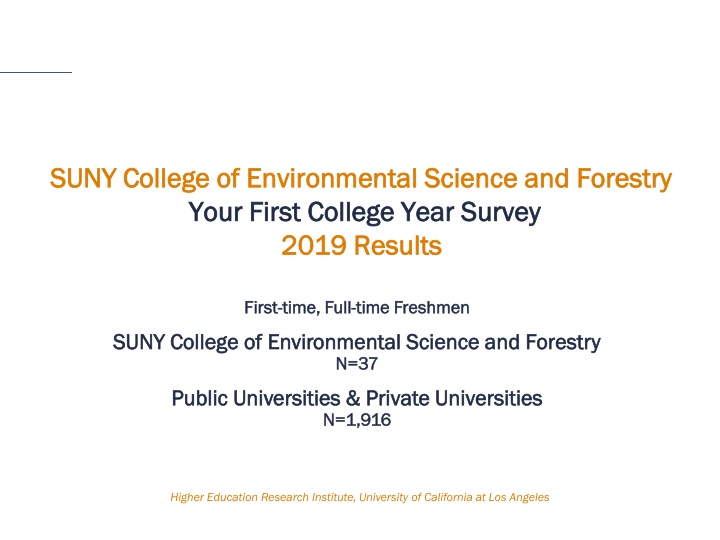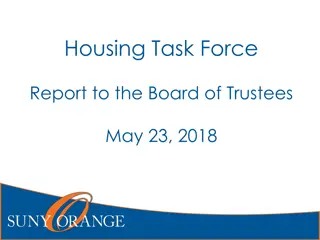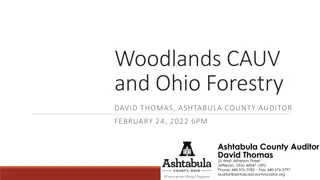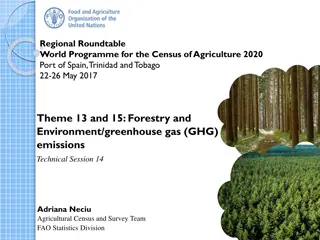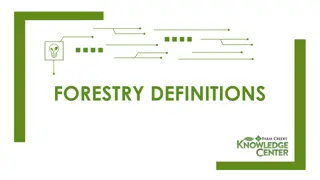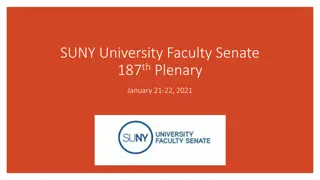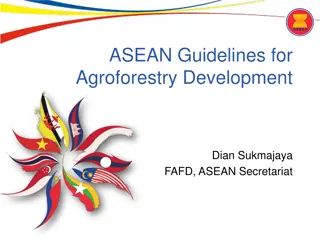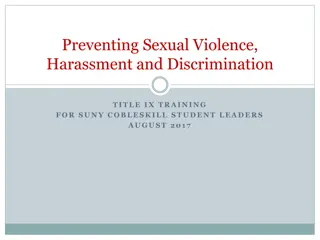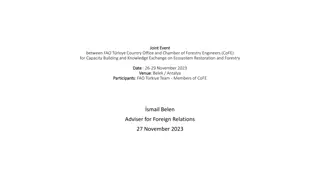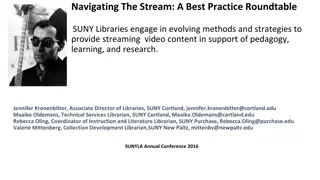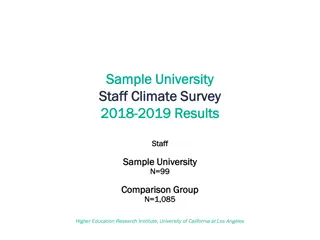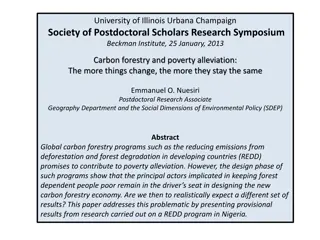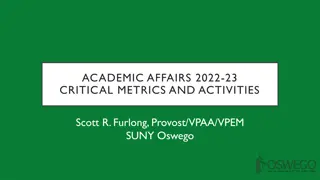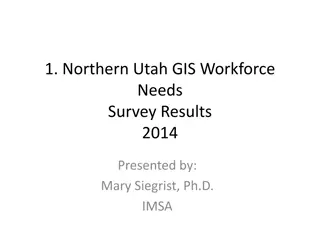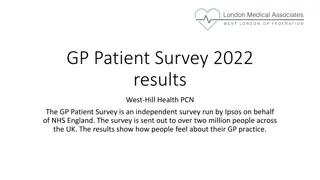Insights from SUNY College of Environmental Science and Forestry Your First College Year Survey 2019 Results
"The Your First College Year Survey results provide valuable insights into the experiences of first-time, full-time freshmen at SUNY College of Environmental Science and Forestry. The survey covers aspects such as adjustment to college life, academic outcomes, co-curricular experiences, satisfaction, growth, and more. Detailed data on demographics, student experiences, and campus climate are included in the survey findings."
Download Presentation

Please find below an Image/Link to download the presentation.
The content on the website is provided AS IS for your information and personal use only. It may not be sold, licensed, or shared on other websites without obtaining consent from the author.If you encounter any issues during the download, it is possible that the publisher has removed the file from their server.
You are allowed to download the files provided on this website for personal or commercial use, subject to the condition that they are used lawfully. All files are the property of their respective owners.
The content on the website is provided AS IS for your information and personal use only. It may not be sold, licensed, or shared on other websites without obtaining consent from the author.
E N D
Presentation Transcript
SUNY College of Environmental Science and Forestry SUNY College of Environmental Science and Forestry Your First College Year Survey Your First College Year Survey 2019 Results 2019 Results First First- -time, Full time, Full- -time Freshmen time Freshmen SUNY College of Environmental Science and Forestry SUNY College of Environmental Science and Forestry N=37 N=37 Public Universities & Private Universities Public Universities & Private Universities N=1,916 N=1,916 Higher Education Research Institute, University of California at Los Angeles Return to Table of Contents Return to Table of Contents
THE FIRST YEAR IS A BIG DEAL Results from the Your First College Year Survey (YFCY) Results from the Your First College Year Survey (YFCY) offer a window into the first offer a window into the first- -year experience, providing important information on your students : important information on your students : year experience, providing Adjustment to college Academic outcomes and experiences Co-curricular experiences Satisfaction Overall growth Return to Table of Contents Return to Table of Contents 2 2019 Your First College Year Survey
Table of Contents Table of Contents Demographics Demographics Gender Identity and Sexual Orientation Gender Identity and Sexual Orientation Race/Ethnicity and Housing Type Race/Ethnicity and Housing Type Financing College Financing College Co Co- -Curricular Experiences Curricular Experiences Social Agency Social Agency Civic Engagement Civic Engagement Civic Awareness Civic Awareness Pluralistic Orientation Pluralistic Orientation Adjustment to College Adjustment to College Academic Adjustment Academic Adjustment Sense of Belonging Sense of Belonging Navigational Action Navigational Action Health and Wellness Health and Wellness Diversity and Campus Climate Diversity and Campus Climate Positive Cross Positive Cross- -Racial Interaction Racial Interaction Negative Cross Negative Cross- -Racial Interaction Racial Interaction Campus Climate and Diversity Campus Climate and Diversity Satisfaction with Campus Diversity Satisfaction with Campus Diversity Academic Outcomes and Experiences Academic Outcomes and Experiences Academic Self Academic Self- -Concept Concept Habits of Mind Habits of Mind Academic Disengagement Academic Disengagement Faculty Interaction Faculty Interaction General Interpersonal Validation General Interpersonal Validation Academic Enhancement Experiences Academic Enhancement Experiences Satisfaction Satisfaction Satisfaction with Coursework Satisfaction with Coursework Satisfaction with Academic Support and Satisfaction with Academic Support and Courses Courses Satisfaction with Services and Community Satisfaction with Services and Community Overall Satisfaction Overall Satisfaction Return to Table of Contents Return to Table of Contents 2019 Your First College Year Survey 3
A Note about CIRP Constructs A Note about CIRP Constructs We use the CIRP Constructs throughout this We use the CIRP Constructs throughout this PowerPoint to help summarize important PowerPoint to help summarize important information about your students from the YFCY. information about your students from the YFCY. Constructs Constructs Constructs statistically aggregate the results from CIRP questions that Constructs statistically aggregate the results from CIRP questions that tap into key aspects of the college experience. They focus on student tap into key aspects of the college experience. They focus on student traits and institutional practices contributing to students academic and traits and institutional practices contributing to students academic and social development. social development. Longitudinal Constructs Longitudinal Constructs Constructs that are included in the CIRP TFS and YFCY that measure Constructs that are included in the CIRP TFS and YFCY that measure change in your student population over time. change in your student population over time. Return to Table of Contents Return to Table of Contents 4 2019 Your First College Year Survey
Demographics Demographics Gender Identity Gender Identity Sexual Orientation Sexual Orientation 70% 62.2% 0% 10%20%30%40%50%60%70% 60% Man/Trans man 35.1% 50% 40% Woman/Trans woman 59.5% 30% 21.6% Gender queer / Gender non-conforming 20% 5.4% 10.8% 10% 2.7% 2.7% 0.0% 0.0% 0.0% Identity not listed above 0.0% 0% Return to Table of Contents Return to Table of Contents 5 2019 Your First College Year Survey
Demographics Demographics Housing Housing Race/Ethnicity Race/Ethnicity 100% 3.4%3.4% 90% 75.7% 80% 31.0% 70% 60% 50% 40% 30% 20% 13.5% 62.1% 5.4% 5.4% 10% 0.0% 0.0% 0.0% 0% Asian Two or more Other White American Indian Black Hispanic Race Residence Halls Special Interest Housing With Family All Other Responses Return to Table of Contents Return to Table of Contents 6 2019 Your First College Year Survey
Financing College Financing College The percentage of students with at least some The percentage of students with at least some funds from these various sources. funds from these various sources. Do you have any concern about your ability to Do you have any concern about your ability to finance your college education? finance your college education? 100% 100% 93.6% 90.4% 86.3% 90% 90% 78.5% 80% 80% 75.6% 70% 70% 64.6% 60% 60% 51.1% 50% 50% 43.0% 40% 40% 25.7% 30% 30% 18.5% 20% 20% 10% 10% 0% 0% Percent indicating "Major" concerns Aid to be repaid Aid not to be repaid Personal resources Family resources Your Institution Comparison Group Your Institution Comparison Group Return to Table of Contents Return to Table of Contents 7 2019 Your First College Year Survey
Adjustment to College Adjustment to College Students ability to adjust academically and socially plays a large role in student success, retention, and satisfaction. Return to Table of Contents Return to Table of Contents
Academic Adjustment Academic Adjustment Academic Adjustment measures the ease with which students adjust to the academic demands of college. 100 90 Construct Items 80 Adjust to the academic demands of college Develop effective study skills Manage your time effectively Understand what your professors expect of you academically 70 60 49.9 49.8 48.6 48.0 46.7 46.1 50 44.4 40 35.8 30 20 10 0 * Includes genderqueer, gender non- conforming, identity not listed above All FTFT Men Women Genderqueer* Your Institution Comparison Group Return to Table of Contents Return to Table of Contents 9 2019 Your First College Year Survey
Sense of Belonging Sense of Belonging The campus community is a powerful source of influence on students development. Sense of Belonging measures the extent to which students feel a sense of academic and social integration on campus. 100 90 Construct Items 80 I feel I am a member of this college I feel a sense of belonging to this campus I see myself as part of the campus community If asked, I would recommend this college to others 70 60 55.1 51.7 51.3 50.8 49.8 49.4 49.2 48.2 50 40 30 20 10 0 * Includes genderqueer, gender non- conforming, identity not listed above All FTFT Men Women Genderqueer* Your Institution Comparison Group Return to Table of Contents Return to Table of Contents 10 2019 Your First College Year Survey
Navigational Action Navigational Action These items illustrate how often students participated in institutional programs or engaged in activities that would help them successfully traverse the institution. 100% 96.3% 90% 80% 70% 60% 50% 44.0% 42.7% 40% 30% 24.9% 20% 13.0% 10% 3.7% 0% Taken a course or first-year seminar designed to help students adjust to college Enrolled in a formal program where a group of students takes two or more courses together (e.g., FIG, learning community, linked courses) Sought personal counseling Comparison Group Yes Your Institution Yes Return to Table of Contents Return to Table of Contents 11 2019 Your First College Year Survey
Navigational Action Navigational Action These items illustrate how often students participated in institutional programs or engaged in activities that would help them successfully traverse the institution. 100% 90% 80% 70% 60% 50% 4.0% 40% 4.0% 4.7% 30% 2.2% 20% 0.0% 40.0% 4.6% 36.0% 33.5% 28.7% 10% 20.0% 15.8% 0% Student Psychological Services Career services Financial aid advising Your Institution Frequently Occasionally Comparison Group Frequently Occasionally Return to Table of Contents Return to Table of Contents 12 2019 Your First College Year Survey
Health and Wellness Health and Wellness Students physical and emotional well-being can affect many important aspects of the student experience including academic performance and persistence. These items gauge student behaviors, attitudes, and experiences related to health and wellness. 100% 90% 80% 23.6% 15.6% 50.2% 70% 19.5% 42.4% 25.0% 65.6% 60% 71.9% 50% 40% 65.6% 62.0% 30% 60.2% 56.3% 48.6% 46.1% 20% 28.1% 10% 18.8% 0% Felt overwhelmed by all you had to do Maintained a healthy diet Felt anxious Had adequate sleep Your Institution Frequently Occasionally Comparison Group Frequently Occasionally Return to Table of Contents Return to Table of Contents 13 2019 Your First College Year Survey
Academic Outcomes Academic Outcomes and Experiences and Experiences Students develop skills, knowledge, and abilities through their experiences both in and out of the classroom. Return to Table of Contents Return to Table of Contents
Academic Self Academic Self- -Concept Concept Academic Self-Concept is a unified measure of students beliefs about their abilities and confidence in academic environments. 100 90 80 Construct Items 70 Self-rated academic ability Self-rated mathematical ability Self-rated self-confidence (intellectual) Self-rated drive to achieve 60 53.2 51.6 50.5 49.4 49.1 47.7 47.0 45.9 50 40 30 20 10 0 * Includes genderqueer, gender non- conforming, identity not listed above All FTFT Men Women Genderqueer* Your Institution Comparison Group Return to Table of Contents Return to Table of Contents 15 2019 Your First College Year Survey
Habits of Mind Habits of Mind Habits of Mind is a unified measure of the behaviors and traits associated with academic success. These learning behaviors are seen as the foundation for lifelong learning. Construct Items 100 Support your opinion with logical argument Seek solutions to problems and explain them to others Seek alternative solutions to a problem Evaluate the quality or reliability of information you received Ask questions in class Take a risk because you felt you had more to gain Explore topics on your own, even though it was not required for a class Accept mistakes as part of the learning process Revise your papers to improve your writing Look up scientific research articles and resources 90 80 70 60 51.2 49.4 49.1 48.3 47.7 47.4 46.5 50 44.6 40 30 20 10 0 All FTFT Men Women Genderqueer* * Includes genderqueer, gender non- conforming, identity not listed above Your Institution Comparison Group Return to Table of Contents Return to Table of Contents 16 2019 Your First College Year Survey
Academic Disengagement Academic Disengagement Academic Disengagement measures the extent to which students engage in behaviors that are inconsistent with academic success. 100 90 80 Construct Items 70 56.3 60 Been late to class Skipped class Turned in course assignment(s) late Turned in course assignments that did not reflect your best work Fell asleep in class 52.9 51.8 51.1 50.2 48.8 48.0 46.3 50 40 30 20 10 0 All FTFT Men Women Genderqueer* * Includes genderqueer, gender non- conforming, identity not listed above Your Institution Comparison Group Return to Table of Contents Return to Table of Contents 17 2019 Your First College Year Survey
Faculty Interaction Faculty Interaction Faculty Interaction: Contact and Communication measures the amount and type of interactions students have with faculty that are appropriate for the first year of college, as well as satisfaction with these issues. 100 90 Construct Items 80 Communicated regularly with your professors Asked a professor for advice after class Amount of contact with faculty Faculty during office hours Faculty outside of class or office hours 70 60 51.4 50.4 48.9 47.8 47.2 46.8 46.4 45.8 50 40 30 20 10 0 * Includes genderqueer, gender non- conforming, identity not listed above All FTFT Men Women Genderqueer* Your Institution Comparison Group Return to Table of Contents Return to Table of Contents 18 2019 Your First College Year Survey
General Interpersonal Validation General Interpersonal Validation These items measure the extent to which students believe faculty and staff provide attention to their development. 100% 90% 19.4% 80% 15.8% 70% 60% 29.0% 25.8% 23.3% 20.7% 50% 40% 71.0% 63.7% 30% 45.2% 45.2% 44.9% 43.8% 20% 10% 0% At least one faculty member has taken an interest in my development Faculty empower me to learn here At least one staff member has taken an interest in my development Your Institution Strongly Agree Agree Comparison Group Strongly Agree Agree Return to Table of Contents Return to Table of Contents 19 2019 Your First College Year Survey
Academic Enhancement Experiences Academic Enhancement Experiences Opportunities to apply learning inside and outside the classroom deepen students academic involvement, allowing them to make meaningful intellectual connections and communicate their knowledge to others. 100% 90% 80% 27.2% 70% 18.0% 52.0% 20.0% 60% 16.0% 11.5% 50% 32.0% 10.7% 40% 30% 60.2% 59.8% 52.0% 52.0% 51.2% 20% 40.0% 38.4% 32.0% 10% 0% Accessed your campus' library resources electronically Received tutoring Communicated regularly with your professors Worked with classmates on group projects Your Institution Frequently Occasionally Comparison Group Frequently Occasionally Return to Table of Contents Return to Table of Contents 20 2019 Your First College Year Survey
Co Co- -curricular Experiences curricular Experiences Co-curricular experiences provide opportunities for students to grow intellectually, interpersonally, and emotionally. Return to Table of Contents Return to Table of Contents
Social Agency Social Agency Activities and beliefs equip and empower students to create a world that is equitable, just, democratic and sustainable. Social Agency measures the extent to which students value political and social involvement as a personal goal. 100 90 Construct Items 80 Participating in a community action program Helping to promote racial understanding Becoming a community leader Keeping up to date with political affairs Influencing social values Helping others who are in difficulty 70 58.4 60 50.7 50.6 50.5 50.3 50.1 50.0 49.2 50 40 30 20 10 0 All FTFT Men Women Genderqueer* * Includes genderqueer, gender non- conforming, identity not listed above Your Institution Comparison Group Return to Table of Contents Return to Table of Contents 22 2019 Your First College Year Survey
Civic Engagement Civic Engagement Engaged citizens are a critical element in the functioning of our democratic society. Civic Engagement measures the extent to which students are motivated and involved in civic, electoral, and political activities. 100 Construct Items 90 Publicly communicated your opinion about a cause I am interested in seeking information about current social and political issues Worked on a local, state, or national political campaign Demonstrated for a cause (e.g., boycott, rally, protest) Keeping up to date with political affairs Influencing social values Helped raise money for a cause or campaign Performed volunteer work 80 70 62.5 60 51.0 50.8 50.2 50.0 49.9 49.7 49.6 50 40 30 20 10 0 All FTFT Men Women Genderqueer* * Includes genderqueer, gender non- conforming, identity not listed above Your Institution Comparison Group Return to Table of Contents Return to Table of Contents 23 2019 Your First College Year Survey
Civic Awareness Civic Awareness The ability to evaluate, question, and develop solutions affecting their local and global communities is an important skill. Civic Awareness measures students understanding of the issues facing their community, nation, and the world. 100 90 Construct Items 80 Understanding of national issues Understanding of global issues Understanding of the problems facing my community 70 56.0 60 54.6 54.1 53.7 51.4 50.4 49.8 49.4 50 40 30 20 10 0 All FTFT Men Women Genderqueer* * Includes genderqueer, gender non- conforming, identity not listed above Comparison Group Your Institution Return to Table of Contents Return to Table of Contents 24 2019 Your First College Year Survey
Pluralistic Orientation Pluralistic Orientation Pluralistic Orientation measures skills and dispositions appropriate for living and working in a diverse society. 100 Construct Items 90 Tolerance of others with different beliefs Ability to work cooperatively with diverse people Ability to discuss and negotiate controversial issues Openness to having my views challenged Ability to see the world from someone else's perspective 80 70 60 52.0 49.9 49.5 49.3 48.8 48.7 48.3 47.0 50 40 30 20 10 0 All FTFT Men Women Genderqueer* * Includes genderqueer, gender non- conforming, identity not listed above Your Institution Comparison Group Return to Table of Contents Return to Table of Contents 25 2019 Your First College Year Survey
Diversity and Campus Climate Diversity and Campus Climate The social and psychological climate on campus can impact students ability to benefit from their educational environment and their academic success. Return to Table of Contents Return to Table of Contents
Positive Cross Positive Cross- -Racial Interaction Racial Interaction Contact with diverse students allows students to gain valuable insights about themselves and others. Positive Cross-Racial Interaction is a unified measure of students level of positive interaction with diverse peers. 100 Construct Items 90 80 Had intellectual discussions outside of class Shared personal feelings and problems Dined or shared a meal Had meaningful and honest discussions about race/ethnic relations outside of class Studied or prepared for class Socialized or partied Pursued (by), dated, or otherwise intimately involved Pursued (by), dated, or otherwise intimately involved * Includes genderqueer, gender non- conforming, identity not listed above 70 57.5 60 51.9 51.8 51.4 50.5 50.4 50.4 50.3 50 40 30 20 10 0 All FTFT Men Women Genderqueer* Your Institution Comparison Group Return to Table of Contents Return to Table of Contents 27 2019 Your First College Year Survey
Negative Cross Negative Cross- -Racial Interaction Racial Interaction Contact with diverse students allows students to gain valuable insights about themselves and others. Negative Cross-Racial Interaction is a unified measure of students level of negative interaction with diverse peers. 100 90 80 Construct Items 70 64.3 Had tense, somewhat hostile interactions Felt insulted or threatened because of your race/ethnicity Had guarded, cautious interactions Felt ignored or invisible because of your race/ethnicity Felt ignored or invisible because of your race/ethnicity 60 52.0 51.1 51.0 51.0 50.8 50.4 49.2 50 40 30 20 10 0 * Includes genderqueer, gender non- conforming, identity not listed above All FTFT Men Women Genderqueer* Your Institution Comparison Group Return to Table of Contents Return to Table of Contents 28 2019 Your First College Year Survey
Campus Climate and Diversity Campus Climate and Diversity A diverse and inclusive campus environment strengthens students learning experience and prepares them to participate in an increasingly diverse society. 90% 80% 19.4% 70% 13.6% 60% 50% 40% 64.5% 62.6% 30% 16.1% 4.6% 20% 2.8% 9.7% 2.3% 3.2% 10% 18.8% 18.2% 16.1% 14.5% 12.9% 12.9% 0% There is a lot of racial tension on this campus In class, I have heard faculty express stereotypes I see myself as part of the campus community Sexual violence is prevalent on this campus Your Institution Strongly Agree Agree Comparison Group Strongly Agree Agree Return to Table of Contents Return to Table of Contents 29 2019 Your First College Year Survey
Satisfaction with Campus Diversity Satisfaction with Campus Diversity A diverse campus including students, faculty, and ideas has a powerful impact on the student experience. These items gauge students satisfaction with the diversity of faculty, student body, and beliefs. 100% 90% 80% 70% 26.7% 20.2% 60% 50% 10.3% 40% 11.2% 16.7% 10.0% 30% 52.8% 50.0% 20% 35.6% 33.9% 30.0% 26.7% 10% 0% Racial/ethnic diversity of faculty Racial/ethnic diversity of student body Respect for the expression of diverse beliefs Your Institution Very Satisfied Satisfied Comparison Group Very Satisfied Satisfied Return to Table of Contents Return to Table of Contents 30 2019 Your First College Year Survey
Satisfaction Satisfaction Understanding how students perceive their college experience identifies areas that are working well and sheds light on those that need improvement. Return to Table of Contents Return to Table of Contents
Satisfaction with Satisfaction with Coursework Satisfaction with Coursework measures the extent to which students see their coursework as relevant, useful, and applicable to their academic success and future plans. Coursework 100 90 Construct Items 80 70 Relevance of coursework to future career plans Relevance of coursework to everyday life General education or core curriculum courses First-year programs (e.g., first-year seminar, learning community, linked courses, common book) 60 53.5 51.5 50.7 49.7 49.0 48.5 48.4 48.2 50 40 30 20 10 0 * Includes genderqueer, gender non- conforming, identity not listed above All FTFT Men Women Genderqueer* Your Institution Comparison Group Return to Table of Contents Return to Table of Contents 32 2019 Your First College Year Survey
Satisfaction with Academic Support and Courses Satisfaction with Academic Support and Courses Gauges use of and satisfaction with campus academic support structures and types of coursework required in general education. 100% 90% 80% 70% 33.3% 26.7% 15.7% 23.0% 60% 13.3% 23.1% 21.9% 50% 15.9% 40% 30% 53.6% 53.3% 53.3% 50.0% 48.8% 44.3% 40.6% 20% 37.3% 10% 0% Technology resources Academic advising First-year programs Overall quality of instruction Your Institution Very Satisfied Satisfied Comparison Group Very Satisfied Satisfied Return to Table of Contents Return to Table of Contents 33 2019 Your First College Year Survey
Satisfaction with Services and Community Satisfaction with Services and Community Where students live, how they are oriented to the campus, and the support they receive during the first year are important determinants of their college experience. These items gauge use of and satisfaction with campus services and general community. 100% 90% 80% 70% 60% 50.0% 36.7% 41.9% 17.0% 50% 14.1% 11.9% 40% 30% 45.1% 20% 40.0% 36.7% 36.4% 35.5% 34.4% 10% 0% Orientation for new students Availability of campus social activities Student housing Your Institution Very Satisfied Satisfied Comparison Group Very Satisfied Satisfied Return to Table of Contents Return to Table of Contents 34 2019 Your First College Year Survey
Overall Satisfaction Overall Satisfaction Overall Satisfaction is a unified measure of students satisfaction with the college experience. 100 90 80 70 Construct Items 60 51.9 Overall college experience If given the choice, would you still choose to enroll at your current (or most) recent college? Overall academic experience Overall quality of instruction 50.6 50.1 50.0 49.3 49.0 48.0 47.2 50 40 30 20 10 0 * Includes genderqueer, gender non- conforming, identity not listed above All FTFT Men Women Comparison Group Genderqueer* Your Institution Return to Table of Contents Return to Table of Contents 35 2019 Your First College Year Survey
The more you get to know your students, the better you can understand their needs. For more information about For more information about HERI/CIRP Surveys HERI/CIRP Surveys The Freshman Survey The Freshman Survey Your First College Year Survey Your First College Year Survey Diverse Learning Environments Survey Diverse Learning Environments Survey College Senior Survey College Senior Survey Staff Climate Survey Staff Climate Survey The Faculty Survey The Faculty Survey Please contact: Please contact: heri@ucla.edu heri@ucla.edu (310) 825 (310) 825- -1925 www.heri.ucla.edu www.heri.ucla.edu 1925 Return to Table of Contents Return to Table of Contents 36 2019 Your First College Year Survey
